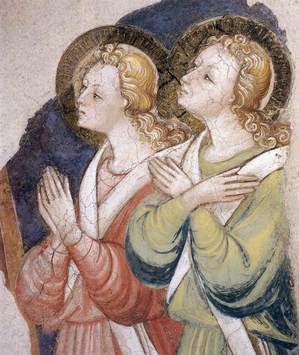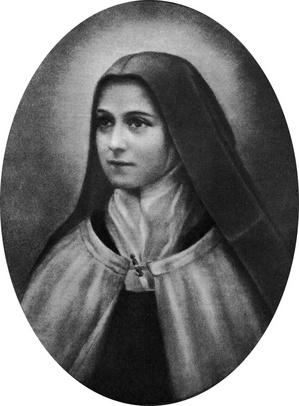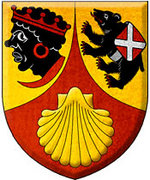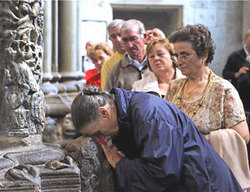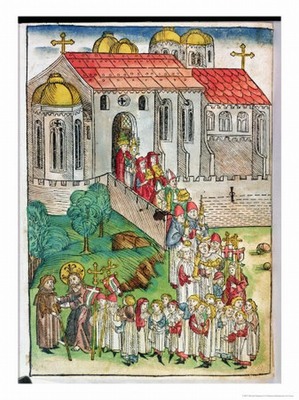Let’s remember Abbot Hugh Anderson, abbot-president and the Benedictine monks of the American Cassinese Congregation who observe today as a patronal feast of their congregation.
Sacrament of Mercy Conference
A friend, the Rev’d Canon Matthew R. Mauriello, has organized the forthcoming Conference on the Sacrament of Mercy to be held in Milwaukee, 8-9 October. There are several excellent speakers to note.
Counsellors to assist Legion of Christ restructuring announced
Archbishop
Velasio de Paolis, C.S., the Pope’s delegate for the Congregation of the Legionaries
of Christ, announced the names his four counsellors who will assist him in
restructuring and renewing the Legion.
The counselors:
- Father Agostino Montan
C.S.I., episcopal vicar for religious life in the Diocese of Rome; - Monsignor Mario
Marchesi, vicar general of the Diocese of Cremona, Italy; - Father Gianfranco
Ghirlanda S.J., former rector of the Pontifical Gregorian University; - Bishop Brian Farrell, LC, secretary of the Pontifical
Council for Promoting Christian Unity.
Archbishop Ricardo Blazquez Perez of
Valladolid, Spain, is the visitator for Regnum Christi.
Saint Thérèse of Lisieux
See that you do not despise one of these little ones…
Choosing weak, confounding strong,
Telling all of heaven’s secrets
To the child that for you longs;
We give thanks for boundless kindness
Shown to this, your little one,
Who, in midst of earthly darkness,
Sought the radiance of your Son.
For Thrérèse, your little flower,
We lift up our song today–
In her life and in her teachings
We are led the “little way,”
From self-seeking to self-knowledge,
That we all might serve in love.
Give us strength to thus surrender;
Shower graces from above.
From her hidden life in Carmel,
You have raised her as a light
In your Church for all your people,
Drawing us from sinful blight
Into fellowship with Jesus,
Image of the Father’s face:
Grant us mission spirit fervent,
Preaching you to ev’ry race.
Teach us by her great example
How to treasure sacrifice;
Show us that small acts of loving
Are true gifts, beyond all price.
As she did, so let us utter,
“Jesus, help me love you more!”
In our lack of might and power,
Let us praise you and adore.
God of mercy, love, and blessing,
Father, Son, and Spirit great,
To your name we give the glory
As your coming we await.
Working here to spread your Kingdom,
Lead us in your little way
Till Thèrése and all your faithful
Sing your name in endless day!
J. Michael Thompson copyright 2010
87 87 D; IN BABILONE, BEACH SPRING
Pope Benedict XVI’s monthly prayer intentions for October 2010
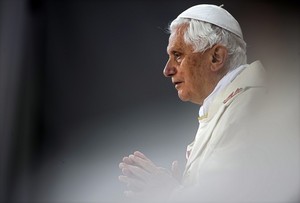 Keeping the Pope and his intentions in front of us in prayer and in conversation, October’s intentions are the following:
Keeping the Pope and his intentions in front of us in prayer and in conversation, October’s intentions are the following:The general intention
increasingly become places where, in light of the gospel, people may experience
the unity of faith and reason.
help Christians realize that the task of proclaiming Christ is a necessary
service to which the Church is called for the benefit of humanity.
Eleuterio Fortino, RIP: the soul and motor of the Christianity Council at the Vatican
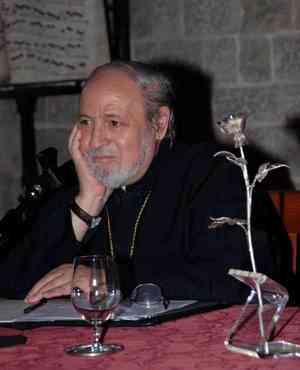 On 22 September 2010, a giant in the world of
On 22 September 2010, a giant in the world of
ecumenism and Eastern Christianity died after living with illness. No one can
doubt the sentiment expressed by the Pope saying that Monsignor Fortino had a “generous
commitment with intelligence and passion at the service of unity.” The Pope
last saw Monsignor Fortino on June 28 with the delegation of the Ecumenical
Patriarch Bartholomew I. A telegram was sent through his secretary of state,
Cardinal Tarcisio Bertone, honoring the life of the undersecretary (third in
charge) of the Pontifical Council for Promoting Christian Unity, who focused
particularly on relations with the Orthodox Churches.
Saint Jerome
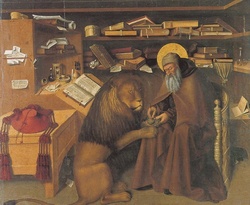 At Mass today the preacher told us of a vision Saint Jerome had of Christ who asked him: Are you going to follow Cicero or me? (Jerome was educated in Latin literature and was a “student” of Cicero.) We know the end of the story for Jerome, but what of each of us?
At Mass today the preacher told us of a vision Saint Jerome had of Christ who asked him: Are you going to follow Cicero or me? (Jerome was educated in Latin literature and was a “student” of Cicero.) We know the end of the story for Jerome, but what of each of us?
Because Christ exists
“Because this Christ exists,” Father Luigi Giussani writes in his book on Charity, “there is no longer any man who doesn’t interest me.”
Saints Michael, Gabriel and Raphael, archangels
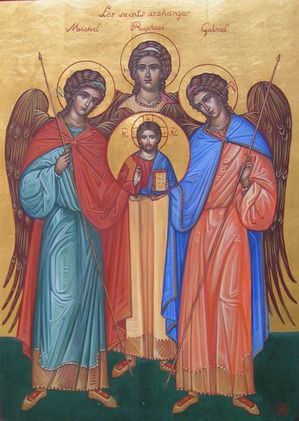 Our Catholic faith teaches us that angels have a general and yet an important part to play in our salvation history, especially personally guiding us. Moreover, the Archangels Michael, Gabriel and Raphael are given to us by God for very specific purposes and they are the only angels named in sacred Scripture.
Our Catholic faith teaches us that angels have a general and yet an important part to play in our salvation history, especially personally guiding us. Moreover, the Archangels Michael, Gabriel and Raphael are given to us by God for very specific purposes and they are the only angels named in sacred Scripture.
And so today, the Church honors the archangels, invokes their intercession and relies on their assistance in the spiritual warfare we daily face.
In Hebrew, “Michael” means “Who is like God?” Saint Michael is mentioned four times in Scripture: Daniel 10 and 12, in Jude and in Revelation. Scripture reveals to us that Saint Michael is known as the “Prince of the Heavenly Host,” hence, the leader of all angels. It is to the Prince of the Heavenly that we owe a debt of gratitude for casting down to Hell Lucifer and the evil spirits; he is invoked for protection against Satan and all evil.
Sacred Tradition teaches that there are four offices connected to Saint Michael:
- to fight against Satan, his minions and the power of evil
- to rescue and protect the faithful from evil, especially at the hour of death
- to lead the people of God to full communion with God Himself
- to call our souls to judgment before God.
We know the archangel from his announcement of the dawn of salvation to Mary: “I am Gabriel, who stand before God” (Luke 1:19). What is crucial to remember about Gabriel are his two announcements in the New Testament: the birth of John the Baptist to his father Zachary and of the Incarnation, the Word made flesh in Mary. Saint Gabriel, whose name means “God’s strength,” is also mentioned four times in Scripture.
Again, sacred Tradition tells us that it is Saint Gabriel who appeared to Saint Joseph and to the shepherds. At the beginning of the Passion it was Gabriel who “strengthens” Jesus in the his agony of the garden.
“I am the angel Raphael, one of the seven, who stand before the Lord” (Tobit 12:15)
Saint Raphael, whose name means “God has healed” because of his healing of Tobias’ blindness in the Book of Tobit. This book in the Old Testament is the only book in which Raphael is mentioned. He is the archangel of healing and acts of mercy. Tradition tells us that Saint Raphael is the angel in John 5:1-4 who descended upon the pond and bestowed healing powers upon it so that the first to enter it after it moved would be healed of whatever infirmity he was suffering.
As point of trivia, the Catholic hospital in New Haven, CT is named for Saint Raphael, likely the only one in the USA.
Those familiar with what is called the “old Mass” will remember praying the Prayer to Saint Michael at the conclusion of Mass. In 1899, after a vision of evil, Pope Leo XIII wanted to protect the Church and instructed that his prayer be prayed by all, especially the priest. I can’t recommend the prayer enough to you when making your thanksgiving following Mass or the Divine Office. Plus, I would recommend that you pray the Prayer to Saint Michael prior to going to bed.
Saints Michael, Gabriel and Raphael, pray for us.
Pope regards himself as a pilgrim, do you?
We are all pilgrims; we are all called to seek the face of God; we are all called to follow the Divine Other; we are called to dine richly on the divine gift of the Eucharist, the Food for the journey (viaticum) and to rest on the heart of Christ. I remember my religious superiors telling me that in making a pilgrimage Saint Ignatius of Loyola laid more emphasis on what happened to one’s heart during the pilgrimage than merely getting to the destination. While getting to a holy place is important it ranks second to the conversion of heart that is hoped for during the pilgrimage experiment. How true. It wouldn’t matter if you got to Santiago de Compostella or not if your heart wasn’t radically changed according to the mind of Christ. My dream is to make the pilgrimage to the great shrine of Saint James, the place of the Lord’s friend; I pray for the grace that my heart be turned inside-out. In the meanwhile, I’ll make the road to the confessional my walk in the Way of Christ. The pope sets the stage for a pilgrimage spot is and how we Catholics are to be as welcoming as Christ is to the pilgrim. Read a portion of the Pope letter to the bishop and people of Compostella:
With great
pleasure I would like to express my spiritual closeness to the congress
participants to encourage and accompany them in carrying out a pastoral task of
such great importance in ecclesial life. I will personally make a pilgrimage
soon to the tomb of the Apostle Saint James, the “Lord’s friend”, in
the same way that I have made my way to other places in the world which many of
the faithful visit with fervent devotion. In this regard, from the beginning of
my pontificate, I have wanted to live my ministry as the Successor of Peter
with the sentiments of a pilgrim who travels over the roads of the world with
hope and simplicity bringing on his lips and in his heart the saving message of
the Risen Christ, and strengthening his brothers in faith (cf. Lk 22:32). As an
explicit sign of this mission, my coat-of-arms includes the pilgrim’s shell,
among other elements.
In these historic moments in which we are called, with
greater force if possible, to evangelize our world, the riches offered to us by
the pilgrimage to shrines should be highlighted. First of all, for its great
ability to summon and bring together a growing number of pilgrims and religious
tourists, some of whom are in complicated human and spiritual situations,
somewhat distant from living the faith and with a weak ecclesial affiliation.
Christ speaks to all of them with love and hope. The desire for happiness that
is imbedded in the soul finds its answer in Him, and human suffering together
with Him has a meaning. With his grace, the noblest causes also find their
complete fulfillment. As Simeon met with Christ in the temple (cf. Lk 2:25-35),
so too a pilgrim should have the opportunity to discover the Lord in the
shrine.
For this purpose, efforts should be made so that visitors may not forget
that shrines are sacred places in order to be in them with devotion, respect
and propriety. In this way, the Word of Christ, the Son of the living God, can
ring out clearly, and the event of his death and resurrection, the foundation
of our faith, can be proclaimed completely. Very careful attention should also
be given to welcoming the pilgrims, by highlighting, among other elements, the
dignity and beauty of the shrine, the image of “God’s dwelling… with the
human race” (Rev 21:3), the moments and spaces for both personal and
community prayer, and attention to devotional practices. In the same way, it
can never be stressed enough that shrines should be lighthouses of charity,
with unceasing dedication to the neediest through concrete works of solidarity
and mercy, and constant readiness to listen, favoring in particular the
faithful’s reception of the Sacrament of Reconciliation and taking part
worthily in the Eucharistic celebration, making this the center and apex of all
the pastoral activity of the shrines. In this way it will be made manifest that
the Eucharist is indeed the pilgrim’s nourishment, the “Sacrament of the
God who does not leave us alone on the journey but stays at our side and shows
us the way” (Homily on the Solemnity of Corpus Christi, May 22, 2008).
In
fact, different from a wanderer whose steps have no established final
destination, a pilgrim always has a destination, even if at times he is not
explicitly aware of it. And this destination is none other than the encounter
with God through Christ in whom all our aspirations find their response. For
this reason, the celebration of the Eucharist can really be considered the
culmination of the pilgrimage.
As “God’s co-workers” (1 Co 3:9), I
exhort all of you to be dedicated to this beautiful mission so that through
your pastoral care, you will favor in pilgrims the knowledge and imitation of
Christ who continues to walk with us, enlighten our lives with his Word, and
share with us the Bread of Life in the Eucharist. In this way, the pilgrimage
to the shrine will be a favorable occasion to strengthen the desire in those
who visit it to share the wonderful experience with others of knowing they are
loved by God and sent to the world to give witness to that love.
The Vatican,
September 8, 2010
Benedictus PP. XVI
